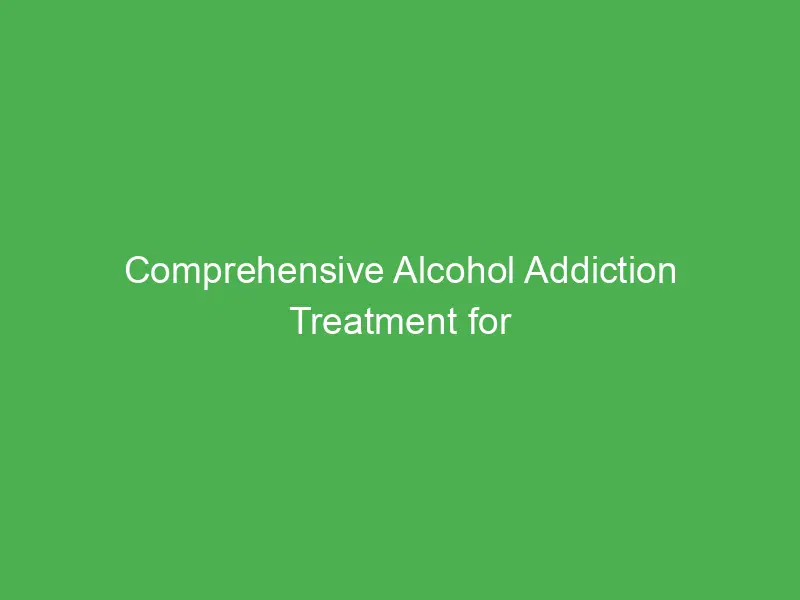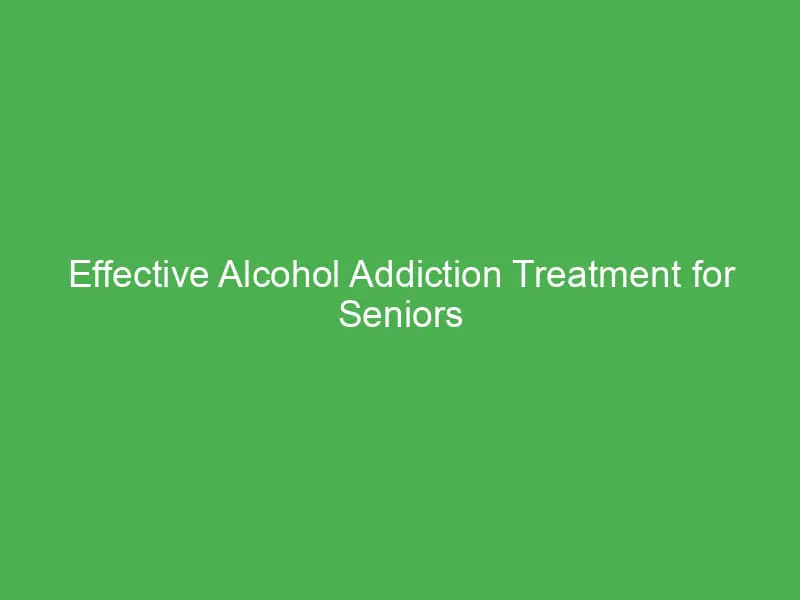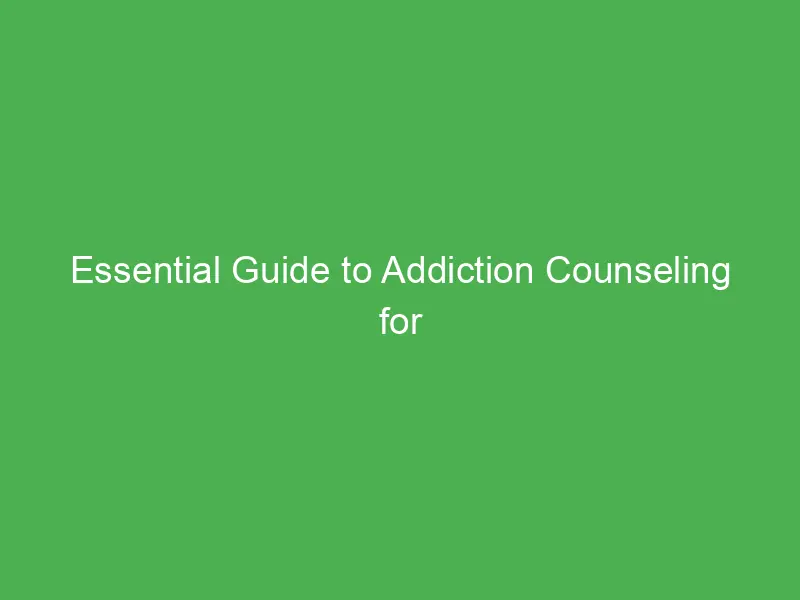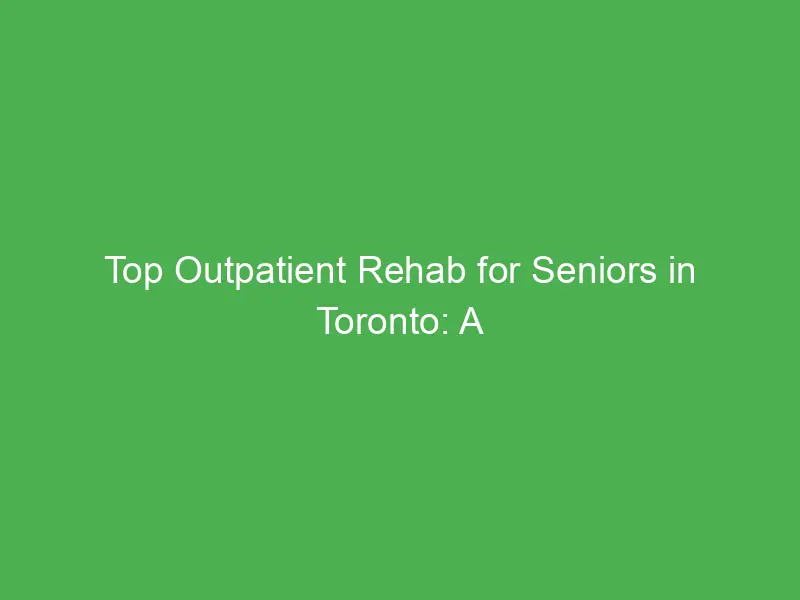As the vibrant city of London continues to evolve, so do the challenges faced by its senior population, particularly regarding alcohol addiction. Many older adults struggle with substance use disorders that can severely impact their health and well-being. Understanding the unique needs of seniors seeking help is crucial in addressing this growing concern.
Alcohol addiction treatment for seniors in London offers tailored solutions that recognise their specific circumstances. With a variety of programmes and support services available, seniors can find the guidance and care they need to reclaim their lives. This article explores effective treatment options, highlighting the importance of compassionate care and community support in helping seniors overcome addiction and embrace a healthier future.
• What is alcohol addiction treatment for seniors in London?
Alcohol addiction treatment for seniors in London involves a comprehensive approach tailored to meet the specific needs of older adults. This treatment typically includes several key steps:
- Assessment and Evaluation
Assessment processes begin with a thorough evaluation conducted by healthcare professionals. This involves understanding the individual’s alcohol use history, physical health, mental health, and social circumstances. The aim is to create a customised treatment plan.
- Detoxification
Detoxification is often the first step in treatment, seeking to safely manage withdrawal symptoms under medical supervision. This may involve inpatient care, where seniors can receive round-the-clock support, or outpatient services for those with milder dependencies.
- Therapeutic Interventions
Therapeutic interventions utilise various approaches such as cognitive-behavioural therapy (CBT) and motivational interviewing. These sessions focus on addressing the psychological aspects of addiction, helping seniors understand triggers, develop coping strategies, and enhance motivation for recovery.
- Medication Management
Medication may be prescribed to assist with cravings or co-occurring mental health disorders. Doctors carefully consider the potential interactions with other medications seniors may be taking, ensuring safe and effective treatment.
- Support Groups
Participation in support groups like Alcoholics Anonymous (AA) fosters a sense of community and shared experience. These groups encourage seniors to connect with peers in recovery, share insights, and maintain accountability.
- Family Involvement
Involving family members in the treatment process can significantly benefit seniors. Family therapy sessions are encouraged to improve communication and rebuild relationships affected by addiction.
- Aftercare and Relapse Prevention
Aftercare services play a vital role in sustaining recovery. This step may include ongoing therapy, group meetings, and regular check-ins with addiction specialists to prevent relapse and promote long-term health.
By addressing the unique challenges faced by seniors, alcohol addiction treatment in London aims to create a supportive environment conducive to effective recovery and improved well-being.
• Benefits of alcohol addiction treatment for seniors in London
- Improved Physical Health
Alcohol addiction can lead to numerous health issues, including liver disease and cardiovascular problems. Treatment helps seniors regain their physical health through medical support and lifestyle changes tailored to their needs.
- Enhanced Mental Well-being
Treatment addresses co-occurring mental health disorders, such as depression and anxiety, which are prevalent among seniors. Therapeutic interventions can significantly improve overall mental well-being and reduce feelings of loneliness.
- Increased Life Satisfaction
Engaging in recovery programmes helps seniors rediscover hobbies and interests, enhancing their quality of life. Participation in social activities also fosters connections, leading to greater life satisfaction.
- Tailored Supportive Environment
Treatment facilities in London offer environments specifically designed for the elderly, with staff trained to address unique challenges they face. This specialised care promotes an understanding atmosphere conducive to healing.
- Accessible Community Resources
Seniors benefit from local community resources aimed at supporting recovery, such as support groups and outreach services. These resources foster a sense of belonging and provide ongoing encouragement.
- Family Involvement
Treatment programmes encourage family participation, helping to strengthen relationships and create a supportive network. This involvement can enhance the recovery process and provide seniors with a solid foundation for long-term success.
- Aftercare and Relapse Prevention
Comprehensive treatment includes aftercare planning tailored for seniors, focusing on relapse prevention strategies. Ongoing support ensures sustained recovery and reduces the risk of relapse, promoting long-term health.
- Improved Cognitive Function
Sobriety can lead to enhanced cognitive abilities in seniors, including better memory and concentration. Treatment helps to mitigate the effects of alcohol on the brain, allowing for greater mental clarity and overall cognitive improvement.
• How to Find the Best alcohol addiction treatment for seniors in London
- Research Treatment Options
Research various treatment facilities that cater specifically to seniors. Look for programmes that focus on age-related needs, such as medical care for chronic conditions, and those that offer mental health support.
- Verify Credentials and Accreditation
Verify that the treatment centres are accredited by relevant bodies, such as the Care Quality Commission (CQC). This ensures adherence to high standards of care and safety.
- Consider Location
Consider the location of treatment facilities. Choose centres situated in accessible neighbourhoods in London to make visiting easier for family and friends, providing crucial support.
- Evaluate Treatment Approaches
Evaluate the therapeutic approaches employed by facilities. Look for those that offer a combination of group therapy, individual counselling, and support for co-occurring disorders. Cognitive-behavioural therapy is particularly effective for seniors.
- Inquire About Medical Supervision
Inquire whether detoxification and treatment programmes include medical supervision. This aspect is vital for seniors, as they may experience withdrawal symptoms differently due to medical complexities.
- Assess Aftercare Options
Assess the availability of aftercare services. Effective aftercare plays a significant role in long-term recovery, helping seniors maintain sobriety and manage potential relapses.
- Look for Supportive Environments
Look for facilities that foster a supportive community atmosphere. Environments that encourage social interaction and the rebuilding of relationships can enhance recovery outcomes.
- Seek Family Involvement
Seek treatment programmes that emphasise family involvement. Family education and participation can strengthen support systems, which are crucial for the recovery process.
- Read Reviews and Testimonials
Read reviews and testimonials from previous patients and families. This can provide insights into the effectiveness of treatment programmes and the level of care provided.
- Consult Healthcare Professionals
Consult physicians or geriatric specialists for advice on suitable treatment options. They can offer valuable recommendations based on individual health needs and concerns.
• Best Practices for alcohol addiction treatment for seniors in London
- Personalised Assessment: Comprehensive assessments conducted by healthcare professionals ensure that treatment plans address the specific health issues and needs related to ageing.
- Medical Detoxification: Supervised detoxification helps minimise withdrawal symptoms and ensures seniors have necessary medical support, making the process safer and more comfortable.
- Integrated Therapeutic Approaches: Utilising cognitive-behavioural therapy and other therapeutic interventions caters to both addiction and co-occurring mental health disorders, promoting holistic recovery.
- Group Therapy Participation: Encouraging seniors to join group therapy sessions enhances social support and develops camaraderie with peers facing similar challenges, fostering a sense of community.
- Family Inclusion: Involving family members in treatment establishes a supportive home environment and strengthens relationships, which is crucial for a successful recovery journey.
- Medication Management: Implementing medication-assisted treatment helps manage cravings and addresses any mental health conditions that may complicate recovery, ensuring a comprehensive approach.
- Access to Aftercare: Transitioning into aftercare services, such as support groups and ongoing therapy, helps sustain sobriety and provides continuous encouragement for long-term success.
- Promoting Healthy Activities: Encouraging seniors to engage in hobbies, exercise programmes, or creative therapies promotes physical health and emotional well-being, aiding recovery.
- Tailored Resources: Identifying community resources, such as senior-friendly support networks or local sober activities, can enhance the chances of maintaining sobriety outside of clinical settings.
- Professional Consultations: Regular consultations with healthcare professionals help monitor progress, making necessary adjustments to treatment plans and addressing any arising concerns effectively.
Top Alcohol Addiction Treatment Options for London Seniors
- Social Isolation
Seniors often face social isolation, which can hinder recovery. Limited mobility or the loss of close friends may exacerbate feelings of loneliness. Encouraging participation in support groups can combat this issue.
- Co-occurring Health Issues
Many older adults have existing health conditions, such as diabetes or heart disease, complicating treatment plans. Coordinating care with healthcare providers ensures that both addiction and other health problems are appropriately managed.
- Stigma and Shame
Stigma surrounding alcohol addiction can lead to reluctance in seeking help. Seniors may fear being judged, particularly from family or peers. Providing educational resources to families can help reduce stigma and promote understanding.
- Cognitive Decline
Cognitive impairments can affect a senior’s ability to comprehend treatment plans or participate in therapies. Simplifying information and employing patient, clear communication can enhance engagement in their recovery process.
- Access to Resources
Limited access to specialised treatment facilities can pose challenges. Seniors should explore local community health services and online resources that offer support tailored to their needs.
- Transportation Issues
Difficulty in travelling to treatment sessions or support meetings can impede progress. Arranging transportation services or utilizing telehealth options can provide essential access to care.
- Family Dynamics
Family involvement is crucial, but existing family tensions can create barriers. Facilitating family therapy sessions can help address underlying issues and improve support systems.
- Financial Concerns
The cost of treatment may be prohibitive for some seniors. Exploring private insurance options, government assistance programmes, or sliding scale fees at facilities can help alleviate financial pressures.
- Motivation Levels
A lack of motivation due to age-related factors can negatively impact recovery. Setting achievable goals and celebrating small successes can help boost motivation and encourage continued progress.
- Managing Cravings
Seniors may experience strong cravings fueled by lifelong habits. Implementing coping strategies, such as mindfulness and distraction techniques, can provide effective management of these cravings.
Key Takeaways
- Tailored Treatment: Alcohol addiction treatment for seniors in London focuses on personalised assessments and care that address the unique health and social circumstances of older adults.
- Comprehensive Support: Successful treatment combines medical detoxification, therapeutic interventions, and family involvement to create a holistic support system for recovery.
- Community Engagement: Participation in support groups and community resources fosters social connections, which is crucial for combating isolation and enhancing life satisfaction.
- Aftercare Importance: Ongoing aftercare services are vital for maintaining sobriety and preventing relapse, ensuring seniors have the necessary support even after initial treatment.
- Addressing Challenges: Recognising and managing factors like stigma, cognitive decline, and co-occurring health issues are essential for effective treatment and recovery for seniors.
- Professional Guidance: Seeking advice from healthcare professionals can help identify the most suitable treatment options, ensuring safe and effective care tailored to individual needs.
• Conclusion
Addressing alcohol addiction in seniors is crucial for their overall well-being. The unique challenges they face require tailored treatment approaches that encompass medical support and compassionate care. By focusing on individual needs and involving family members, recovery becomes a collaborative effort.
The availability of community resources and aftercare services plays a significant role in sustaining sobriety. Encouraging social connections and participation in support groups can combat isolation and promote a healthier lifestyle. With the right support and understanding, seniors can rediscover joy and purpose in their lives, paving the way for a brighter future free from addiction.
Frequently Asked Questions
What are the main challenges faced by seniors in London regarding alcohol addiction?
Seniors in London face multiple challenges with alcohol addiction, including social isolation, stigma, health issues, cognitive decline, and difficulties in accessing resources. These factors can complicate recovery and require tailored support to address their unique needs.
What does tailored treatment for seniors involve?
Tailored treatment for seniors involves comprehensive assessments, medical detoxification, therapeutic interventions, and medication management for cravings and mental health issues. The focus is on compassionate care and ensuring supportive environments to promote recovery.
Looking for more sober travel inspiration? Find your next adventure on our Homepage.
How is the detoxification process managed for older adults?
Detoxification for older adults is conducted under medical supervision to ensure safety and comfort. Healthcare professionals monitor the process to manage potential health risks, making it crucial for older individuals with existing health conditions.
Why is family involvement important in the treatment process?
Family involvement is essential in the treatment process as it helps strengthen relationships and provides emotional support. It fosters a sense of accountability and encourages a supportive environment that is vital for recovery.
What are the benefits of alcohol addiction treatment for seniors?
Benefits include improved physical health, enhanced mental well-being, and increased life satisfaction. Treatment can help seniors rediscover interests, strengthen social connections, and ultimately lead to a healthier lifestyle.
How can seniors find appropriate alcohol addiction treatment in London?
Seniors can find suitable treatment by researching options specifically for their age group, verifying facility credentials, assessing treatment methods, and ensuring access to aftercare services. Reading reviews and consulting healthcare professionals can also provide tailored recommendations.
What role do support groups play in recovery?
Support groups like Alcoholics Anonymous provide a vital space for seniors to share experiences and receive encouragement from peers. They foster community support, reduce feelings of isolation, and enhance motivation for maintaining sobriety.
What best practices should be followed for treating seniors with alcohol addiction?
Best practices include personalised assessments, supervised detoxification, integrated therapeutic approaches, family involvement, and regular access to aftercare services. Encouraging participation in healthy social activities is also beneficial for long-term recovery.
What are common challenges in alcohol addiction treatment for seniors?
Common challenges include stigma, social isolation, transportation issues, co-occurring health problems, and motivational barriers. Addressing these challenges with appropriate resources and strategies is essential for effective treatment outcomes.
How can aftercare prevent relapse among seniors?
Aftercare is crucial in preventing relapse as it provides ongoing support, encourages healthy habits, and helps seniors maintain their commitment to sobriety. Regular professional consultations and access to resources can enhance long-term well-being and success.

Quit drinking on 23 July 2021 after a two-day bender and swapped bars for border crossings and 12-step meetings. Three sober years, 36 countries, 113 travellers (totally dry), fuelled by street food, jelly babies, and a broken Google Maps app. Wandersober is my journal, my SEO lab, and my mission. Featured in GQ, Mirror, Evening Standard, MarketWatch, and more.






